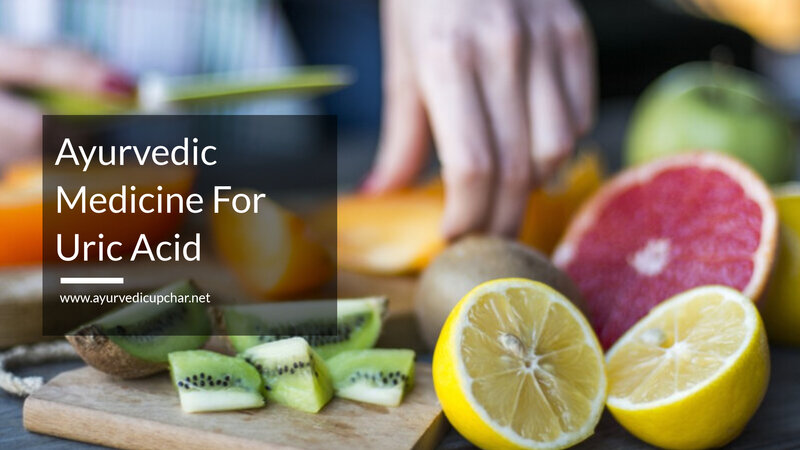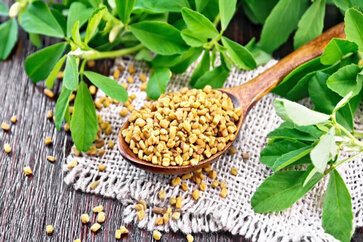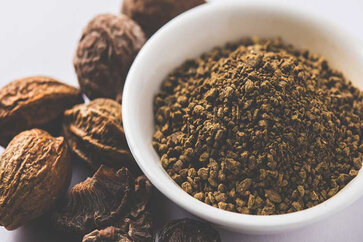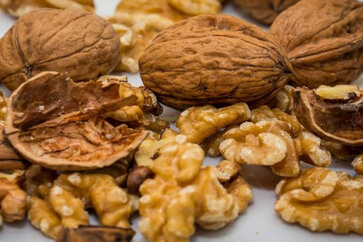Ayurvedic Medicine For Uric Acid
Among the numerous conditions that affect the bones and joints, including osteoarthritis, osteoporosis, and rheumatoid arthritis, gout is another ailment that affects a significant number of adult men and women.

Gout, also known as gouty arthritis, is a common disorder characterized by joint pain, swelling, inflammation, and kidney dysfunction caused by excessive deposits of uric acid crystals. Normally, the body produces compounds called purines, which are also found in certain foods and drinks.
These purines are broken down into uric acid, a chemical component. In normal circumstances, most of the uric acid dissolves in the blood, gets filtered by the kidneys, and is excreted through urine.
However, when uric acid waste accumulates in the body, it begins to crystallize and deposit in the bones, joints, and kidneys, leading to the onset of gout.
Ayurvedic View For Uric Acid
According to Ayurveda, gout is described as “Vata Rakta,” a condition that arises from imbalances in the Vata dosha (the bodily energy composed of air elements) and rakta dhatu (blood tissues).
The accumulation of excessive uric acid disrupts the flow of Vata in the blood, leading to swollen joints, particularly in the big toes. Gout also causes inflammation in various joints such as the knees, ankles, feet, hands, and elbows, resulting in arthritis.
Additionally, it can contribute to the formation of kidney stones and damage to renal tissues.Ancient Ayurvedic texts not only explain the causes and symptoms of gout but also provide detailed information about numerous potent anti-inflammatory herbs.
These herbs enhance blood circulation, reduce uric acid levels, and alleviate joint pain associated with gouty arthritis. These natural remedies are highly effective in relieving discomfort and enhancing joint mobility in individuals with gout.
What Is Gout Disease?
Gout is a painful disease that is found more commonly in men, especially in older men, but it may also affect women. It is generally caused by a condition known as “hyperuricemia” which means there is too much uric acid content in the blood.
But uric acid is actually the excess waste product of metabolism chemical compounds called “purine”, which are also found in alcohol and some foods.
What Foods Help Lower Uric Acid?
Several foods can help lower uric acid levels in the body. Including the following foods in your diet may be beneficial:
1. Cherries: Cherries, especially tart cherries or cherry juice, have been associated with lower levels of uric acid and reduced gout flare-ups.
2. Berries: Berries such as strawberries, blueberries, and raspberries are rich in antioxidants and have anti-inflammatory properties that may help lower uric acid levels.
3. Vegetables: Incorporate plenty of vegetables into your diet, including leafy greens, bell peppers, tomatoes, and broccoli. These vegetables are low in purines and high in nutrients that can help reduce uric acid.
4. Low-Fat Dairy: Low-fat dairy products like skim milk, yogurt, and cheese are associated with lower uric acid levels. They also provide essential nutrients like calcium and vitamin D.
5. Coffee: Moderate coffee consumption has been linked to lower uric acid levels. However, excessive amounts may have adverse effects, so it’s important to consume it in moderation.
6. Nuts and Seeds: Nuts and seeds, such as almonds, flaxseeds, and walnuts, are rich in healthy fats and can help reduce inflammation associated with gout.
7. Whole Grains: Opt for whole grains like brown rice, whole wheat bread, and oats instead of refined grains. Whole grains have been associated with lower uric acid levels.
8. Plant-Based Proteins: Choose plant-based protein sources like legumes (beans, lentils, chickpeas) and tofu instead of animal proteins, as they are generally lower in purines.
9. Water: Staying well-hydrated by drinking an adequate amount of water can help dilute uric acid and promote its excretion through urine.
10. Apples: Apples contain malic acid, which has been suggested to help neutralize uric acid and promote its elimination from the body.
11. Citrus Fruits: Citrus fruits like oranges, lemons, and grapefruits are rich in vitamin C, which has been associated with lower uric acid levels. Vitamin C may also help reduce inflammation.
12. Bananas: Bananas are low in purines and high in potassium. Potassium helps in the excretion of uric acid by the kidneys, potentially reducing its buildup.
13. Pineapple: Pineapple contains an enzyme called bromelain, which has anti-inflammatory properties and may help alleviate gout symptoms. It also offers hydration and beneficial nutrients.
14. Ginger: Ginger has anti-inflammatory effects and may help reduce pain and inflammation associated with gout. It can be consumed fresh, as a spice, or in the form of ginger tea.
15. Turmeric: Curcumin, the active compound in turmeric, has anti-inflammatory properties and may help lower uric acid levels. It can be added to dishes or consumed as a supplement.
16. Olive Oil: Olive oil contains a compound called oleocanthal, which has been shown to have anti-inflammatory properties. It can be used as a healthy alternative to other cooking oils.
17. Green Tea: Green tea is rich in antioxidants called catechins, which have anti-inflammatory effects. Regular consumption of green tea may help lower uric acid levels.
18. Flaxseeds: Flaxseeds are high in omega-3 fatty acids and fiber. They may help reduce inflammation and promote the excretion of uric acid.
19. Watermelon: Watermelon is a hydrating fruit with a high water content. It also contains citrulline, an amino acid that may help regulate uric acid levels.
20. Herbal Teas: Certain herbal teas like nettle leaf tea and dandelion tea have diuretic properties and may aid in flushing out excess uric acid from the body.
Note: It’s important to note that individual responses to specific foods may vary, and it’s always advisable to consult with a healthcare professional or a registered dietitian for personalized dietary recommendations for managing uric acid levels.























